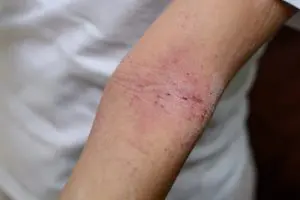
Cipro Associated With Stevens Johnson Syndrome/Toxic Epidermal Necrolysis Reactions. Some medications may trigger a severe sensitivity reaction that may cause serious, sometimes deadly, reactions, such as Stevens-Johnson Syndrome (SJS) and Toxic Epidermal Necrolysis (TEN). Cipro (ciprofloxacin) is one such drug.
The U.S. Food and Drug Administration (FDA) approved Cipro in 1987 to treat a variety of bacterial infections. Cipro is a fluoroquinolone antibiotic that is often prescribed to fight urinary tract infections, respiratory infections, and gastrointestinal infections. Cipro is also used to treat individuals exposed to anthrax. It is recommended that Cipro only be used for infections that cannot be treated with a safer antibiotic given the serious or disabling side effects associated with the drug.
The personal injury attorneys at Parker Waichman LLP have decades of experience representing clients in lawsuits involving alleged drug injuries, including Stevens Johnson Syndrome and Toxic Epidermal Necrolysis. The firm continues to offer free legal consultations to individuals with questions about filing a drug injury lawsuit.
Patient advocates have long argued that current drug allergy alert label information on many over-the-counter and prescription medications do not contain adequate user warnings concerning the risk of the very serious reactions of SJS and Toxic Epidermal Necrolysis (TEN).
Recent injury reports reveal that Cipro may be associated with SJS. In fact, Cipro is one of the most commonly reported medications associated with SJS and reports of SJS and TEN have been submitted since Cipro’s release.
What is SJS/TEN
 Stevens Johnson Syndrome is a rare but extremely severe sensitivity reaction that may be caused by a number of drugs and leaves the patient with blistering of mucous membranes, especially of the mouth, eyes, and genitals, as well as patchy rashes that cause severe skin peeling. The condition may spread to internal organs and may cause serious scarring and even blindness; SJS patients report sometimes feeling as if their skin is being burned from the inside. When over 30 percent of the body is impacted, the condition becomes known as Toxic Epidermal Necrolysis (TEN). Both SJS and TEN may be deadly and often require intensive care or hospital burn unit treatment.
Stevens Johnson Syndrome is a rare but extremely severe sensitivity reaction that may be caused by a number of drugs and leaves the patient with blistering of mucous membranes, especially of the mouth, eyes, and genitals, as well as patchy rashes that cause severe skin peeling. The condition may spread to internal organs and may cause serious scarring and even blindness; SJS patients report sometimes feeling as if their skin is being burned from the inside. When over 30 percent of the body is impacted, the condition becomes known as Toxic Epidermal Necrolysis (TEN). Both SJS and TEN may be deadly and often require intensive care or hospital burn unit treatment.
Specifically, SJS is typically characterized by red or purple skin lesions on the body that peel off in what has been described as an appearance similar to “melting.” When the skin peels, or sloughs, off, tissue or muscle infection may set in. Symptoms may also include swelling of mucus membranes, organ damage, and throat swelling. Extremely serious SJS case may evolve into TEN, which is an extremely aggressive and severe form of SJS. For example, SJS lesions may cover up to 30 percent of a patient’s skin surface; TEN may cover up to 90 percent. TEN progresses much more rapidly that SJS and may became deadly if emergency intervention is not rapidly implemented.
Sadly, not all SJS and TEN sufferers survive and the mortality rate of SJS and TEN is 30-40 percent. Patient survival most likely occurs with early diagnosis. Those who do survive are often left with permanent injuries, such as vision problems, difficulty eating, and scarring. SJS may also cause large areas of the skin to blister and peel, which leads to open sores and infection. TEN causes large areas of the skin to detach from the body, which may lead to lesions developing in the mucous membranes. Symptoms of both may include blisters on the skin and the mucous membranes of the mouth, nose, eyes, and genitals; facial swelling; flu-like symptoms, including fever, sore throat, cough, and burning eyes; hives; open sores; serious skin shedding and sloughing; skin pain; skin rash that is often red or purple and that occurs within hours to days; and tongue swelling. Surviving patients may need skin grafts and some may be left with some level of vision issues or blindness and severe skin damage.
It is critical to stop SJS by early diagnosis and intervention. This involves ceasing taking the medication that has caused the condition; however, the warnings on so many medications are vague and most people do not recognize that SJS has developed when they experience the syndrome in its earliest stages. Because the syndrome and its symptoms are not widely known, people may ignore what initially seems like a minor blister or rash, even though this is a significant red flag for SJS and TEN. While not every rash or blister is SJS, it is vital that patients understand the risks. Also, patients who suddenly develop flu like symptoms should visit their physicians immediately, as these symptoms are early signs of SJS, as well. Experts advise not using medications unless absolutely necessary, and informing your doctor if you experience flu-like symptoms or a blistering and rash while using any drug.
A study published in the Journal of the American Medical Association (JAMA) revealed that individuals who suffered from one episode of SJS or TEN are significantly likelier to experience a second episode. Unfortunately, there is no test to determine if a patient is likely to suffer from SJS/TEN.
In addition to Cipro, other prescription medications are known to be tied to SJS/TEN and often bear a black box warning, the U.S. Food & Drug Administration’s (FDA) most urgent label warning. Antibiotics, such as the sulfa drug co-trimoxazole, which is a trimethoprim and sulfamethoxazole combination; anti-seizure medications, including carbamazepine, phenytoin, phenobarbital, valproic acid, and lamotrigine; and pain medications, such as ibuprofen and naproxen have all been liked to SJS in some patients, but this list can change and is not all-inclusive. While prescription drug label warnings discuss the condition, many over-the-counter (OTC) labels usually only warn of so-called “severe allergic reactions,” making no mention of SJS. Some drug makers have been faulted for not appropriately reporting and listing significant adverse events. For instance, in the past Johnson & Johnson was accused of neglecting to warn parents that its Children’s Motrin and Tylenol can cause SJS/TEN.
While SJS/TEN may be caused by just about any drug, the serious allergic reaction is most often associated with anticonvulsants; antibiotics, such as penicillin and sulfonamides and, now, Cipro; and common anti-inflammatory drugs, such as aspirin, naproxen, and ibuprofen.
Need Legal Help Regarding Cipro?
The personal injury attorneys at Parker Waichman LLP offer free, no-obligation case evaluations. For more information, fill out our online contact form or call 1-800-YOURLAWYER (1-800-968-7529).
[sc name=”post-footers”]